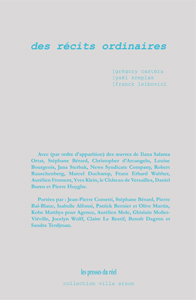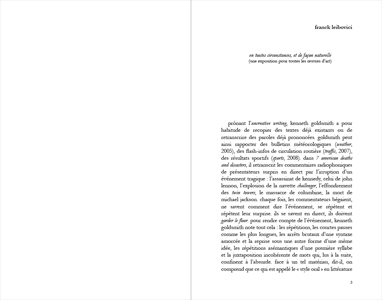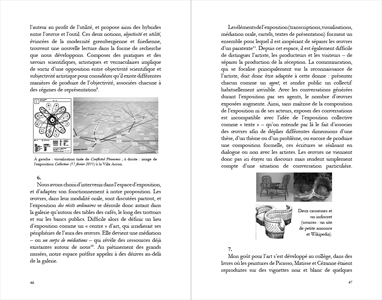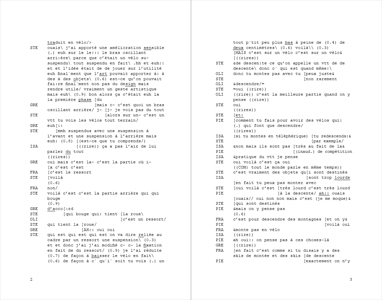You are sitting at a table in a bar with some friends. You are discussing a work of art, or
several works. Have you ever wondered if such a conversation were part of the public life
of the works in question? If one were to limit the life span of a work of art to the opening
hours of the exhibitions featuring it, how much shorter it would be! But take into account
all the moments when it is being talked about, discussed, linked to other works...
Informal and ordinary conversations are how a work of art travels throughout the ages.
This is one of the ways that works are transmitted, recreated, made to exist.
Works of art can exist in various manners, and according to each manner they take on different
attributes and perform differently. Has anyone ever wondered what the attributes of a
work of art were in the context of a conversation? Certainly not the same as when they
are seen in a book or when the viewer is physically confronted to them.
What if, in a conversation, it were no longer us talking about a work, but rather the work itself that was
being set into action?
On ordinary conversations explores this hypothesis: it is a search for these attributes.
The exhibition On ordinary conversations is a training exhibition which encourages us to make new
ears for ourselves.
So that the very next day, sitting in a bar with some friends and talking
about a work of art – or several of them – one might detect a presence: “during this
conversation, a work of art is being set into action”...
Grégory Castéra, Yaël Kreplak, Franck Leibovici
Published on the occasion of the eponymous exhibition at Villa Arson, Nice, from April to June 2014.
Works by Ilana Salama Ortar,
Stéphane Bérard, Christopher d'Arcangelo,
Louise Bourgeois, Jana Sterbak, News Syndicate Company,
Robert Rauschenberg,
Marcel Duchamp,
Franz Erhard Walther,
Aurélien Froment,
Yves Klein, le Château de Versailles,
Daniel Buren,
Pierre Huyghe.
Evoked by Jean-Pierre Cometti,
Stéphane Bérard,
Pierre Bal-Blanc, Isabelle Alfonsi,
Patrick Bernier and Olive Martin, Kobe Matthys pour Agence,
Aurélien Mole,
Ghislain Mollet-Viéville, Jocelyn Wolff, Claire Le Restif, Benoît Dagron and Sandra Terdjman.
Grégory Castéra is a curator. His main interest lies in the construction of objectivity in contemporary artistic practices. In 2013 he
created Council with Sandra Terdjman, an agency interested in the ways that art can represent society's issues, by conducting
inquiries and producing works (see
Tacet, on the variety of listening modes, Biennale of Sharjah / École pour Sourds (School
For the Deaf) Al Amal, 2013). Since 2007, he has been the co-author of l'
Encyclopédie de la parole (the
Encyclopedia of
speech), a group exploring the various forms of speech. From 2010 to 2013, he codirected the
Laboratoires d'Aubervilliers with
Natasa Petresin-Bachelez and Alice Chauchat, where he collaborated with several research programs on the production of
discourse within artistic practices. From 2007 to 2009, he also coordinated W, a research group on action in the context of
performance (www.1110111.org). At Bétonsalon, an art and research Center, he created the performance art festival Playtime. In collaboration with Franck Leibovici and Yaël Kreplak, he has been developing research since 2010 on the representation of an ecology of art :
(des formes de vie) - une écologie des pratiques artistiques (
(forms of life) - an ecology of artistic practices), Les Laboratoires d'Aubervilliers, 2012, and
Des récits ordinaires (
On ordinary conversations), Villa Arson, 2014.
Yaël Kreplak does research at the ICAR laboratory (ENS in Lyon) and at the CEMS (IMM-EHESS). Her work deals with
conversational analysis and ethnomethodology, felds that analyze forms of practical knowledge that can be observed in social
interaction. She has been studying ordinary professional relations to the works of art in contemporary art exhibitions, based on
the detailed analysis of work situations (meetings, installations, visits) observed in various arts institutions (mainly the Villa Arson
and the MAC/VAL). In order to analyze the way in which art worlds, art objects and aesthetic behavior function, she has been
studying pragmatism (Dewey) and specifc works dealing with the sociology of art (Becker) or the anthropology of art (
Gell).
Franck Leibovici is an artist and poet. For fve years he has been developing a mini opera for nonmusicians. Based on the
protocols of experimental music, dance, science studies or conversational analysis, the sequences of the Opera can take the
shape of choirs, choreography, installations, conversation, or even Japanese gardens. However they remain unrelated to the
performing arts.
Des récits ordinaires is a new stage of a project studying the ecology of art and artistic practices, which began
with
Nos secrets en alcôves (centre Pompidou, 2009) and continued in 2011-2012 with
(des formes de vie) - une écologie des
pratiques artistiques (Les Laboratoires d'Aubervilliers).






